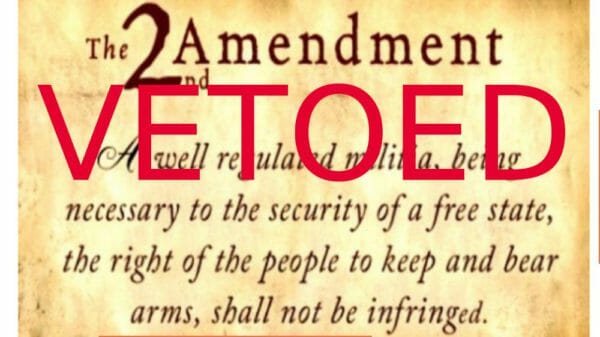
U.S.A. –-(AmmoLand.com)-— A governor’s veto of a Constitutional Carry bill is a setback for Second Amendment supporters and Constitutionalists.
A veto is also a signal the hard work of education has mostly been successful. How else would pro 2A bills reach anti-gun Governors’ desks?
The Constitutional Carry movement was a dream in the thoughts of Second Amendment and Constitutional activists at the turn of the millennia. Today, half of the United States are members of the Constitutional Carry (permitless) club.
During the last eleven years, there have been several governors who vetoed Constitutional Carry bills.
This correspondent found 14 vetoes of Constitutional Carry bills. Nine of the vetoes were by Democrats, five were by Republicans.
Support AmmoLand News
Sign up for the Daily Digest email and protect the 2nd Amendment.Two vetoes of Democrat governors were overridden. No Republican vetoes were overridden.
All states where Constitutional Carry bills were vetoed before 2021 have gone on to pass a Constitutional Carry (permitless) bill into law.
Here is a summation of the vetoes, which governors vetoed Constitutional Carry bills, and which Governors signed Constitutional Carry bills later.
Montana Governors Schweitzer (D) and Bullock (D) vetoed Constitutional Carry three times.
- In 2011, Democrat governor Brian Schweitzer vetoed Constitutional Carry bill HB 271. The legislature did not override the veto.
- In 2015, Democrat governor Steve Bullock vetoed Constitutional Carry bill HB 298.
- In 2017, Governor Bullock vetoed Constitutional Carry bill HB 262.
Montana passed Constitutional Carry in 2021. Republican Governor Greg Gianforte signed it on February 18.
- South Dakota Republican Governor Daugaard vetoed Constitutional Carry twice.
- Republican Governor Daugaard vetoed Constitutional Carry in 2012, and a second time in 2015.
- South Dakota Republican Governor Kristi Noem signed the Constitutional Carry bill SB47 into law on January 31, 2019.
- Utah Republican Governor Herbert vetoed a weak Constitutional bill in 2013.
- Utah Republican Governor Cox signed a much stronger Constitutional Carry (permitless) bill on February 12, 2021.
West Virginia Democrat Governor Tomblin, vetoed Constitutional Carry in 2015, veto. He vetoed a similar bill in 2016, which the legislature overrode in 2016.
Governor Tomblin received the Constitutional carry bill on 26 February. He waited to the last possible day to veto it, 3 March.
The House of Delegates overrode his veto on 4 March, and the Senate completed the override on 5 March, 2016. From state.wv.us:
New Hampshire Democrat Governor Hassan vetoed constitutional carry bills twice, in 2015 and 2016. From concordmonitor.com:
Democratic Gov. Maggie Hassan has vetoed a bill to remove the licensing requirement for carrying concealed guns as expected.
Hassan vetoed a similar bill last year, but Republicans have once again sent the measure to her desk. Hassan is facing off against Republican U.S. Sen. Kelly Ayotte in one of the country’s most competitive Senate contests.
- New Hampshire Republican Governor Sununu signed a Constitutional Carry bill into law on February 22, 2017.
- Missouri Democrat Governor Nixon Vetoed Constitutional Carry. The legislature overrode the veto on September 15, 2016.
- Oklahoma Republican Governor Mary Fallin vetoed a Constitutional Carry bill in 2018.
- Oklahoma Governor Fallin vetoed the Constitutional Carry SB 1212, on May 11 of 2018. Governor Fallin is term-limited out. She is not allowed to run for another term as governor.
- Oklahoma Republican Governor Stitt signed Constitutional Carryon February 27, 2019.
- Louisiana Democrat Governor Bel Edwards vetoed Constitutional Carry in 2021.
- Pennsylvania Democrat Governor Wolf Vetoed Constitutional Carry in 2022.
Constitutional Carry Veto & Passage Analysis:
When a Constitutional Carry bill is vetoed, it shows a majority of the legislature and leadership has been willing to go on record to support the bill. They believe support will gain them more votes than they will lose. Even if they do not wish the bill to pass, this dynamic makes it very hard for them to resist passing the bill as they go forward. It is worthwhile to push for the restoration of Second Amendment rights, even if the bill will be vetoed.
As more and more states have joined the Constitutional Carry club, the momentum for passing bills to restore Second Amendment rights grows and grows. Part of this is pure pragmatism: no ill effects have been shown to exist from the restoration of Second Amendment rights.
(Excepting various pseudo-scholarship using statistics to deceive)
Part of it is the persistent efforts of Second Amendment activists. Much of it is the education of legislators and peace officers, as they experience the lack of problems with the restoration of Second Amendment rights.
Vetoed bills are treasure troves of useful information about which legislators can be trusted; which ones are sympathetic; which ones can be pressured; which ones can be cajoled and horse traded with.
Both Pennsylvania and Louisiana are likely to pass Constitutional Carry bills in the next two years. It will depend on what happens with the governors in those two states.
About Dean Weingarten:
Dean Weingarten has been a peace officer, a military officer, was on the University of Wisconsin Pistol Team for four years, and was first certified to teach firearms safety in 1973. He taught the Arizona concealed carry course for fifteen years until the goal of Constitutional Carry was attained. He has degrees in meteorology and mining engineering, and retired from the Department of Defense after a 30 year career in Army Research, Development, Testing, and Evaluation.

from https://ift.tt/HPO4YGL
via IFTTT

No comments:
Post a Comment